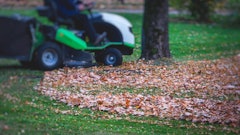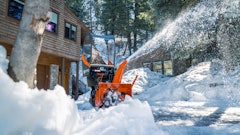
Well over 100 entries were submitted for the first-ever Landscape Industry Hidden Gems list from Green Industry Pros. This list is designed to highlight a variety of landscape and lawn care companies, regardless of sales volume, that have shown a strong post-Great Recession growth trajectory, innovative business practices, and a commitment to sustainability and community.
Download the list, as seen in the Nov/Dec 2014 issue of Green Industry Pros magazine.
As part of the initial entry process, applicants were required to disclose annual sales volume (in 2007 and 2013), along with their number of full-time and seasonal employees. While sales volume is not included, this list does show a six-year sales growth percentage (2007-2013). Companies growing by at least 40% are included on the list. Additionally, employee base is generalized in one of three ways: less than 10 employees, 11-20, more than 20. This gives you a general picture as to how large a given company is. This list also includes the primary services offered by each company.
As you will see, some of the companies on this list have many employees, while others have just a few. Now, naturally, smaller companies have a better chance of realizing explosive sales growth (as a percentage) than large companies do. Thus, some larger companies might cry "foul!" where this list is concerned. But the point of this list is to simply highlight companies that are “on the move”, so to speak. We can all learn from companies, big or small, that are growing and on the move.
On that note, surrounding this list you'll find more background on many of the companies that are included. Here you can read about the innovative business practices these companies are undertaking to grow sales and increase market share.
We hope you find this first-ever Landscape Industry Hidden Gems list to be both interesting and informative. Like any new endeavor, it remains a work in progress. Tweet us @YG_PRO #GIPHiddenGems, comment on our Facebook page, or email us at [email protected] to let us know what you think or ask how to apply for next year’s list. We know there are many more Hidden Gems out there. Do not be afraid to say, “Hey, I think I might be one of them.” If you are growing your business, creating jobs and doing good things for your community, you more than likely are.
Now onto the Business Best Practices from this year’s Hidden Gems. You’ll find a host of opinions, strategies and tactics on the topics of Building Company Culture, Environmentally Sustainable Landscaping; Retention, Referrals, and Building a Business; and Ideas for Unique Add-on Services.
Building company culture
Over-performing companies typically have a well-defined vision that employees understand and buy into. This, in turn, helps create a culture of over-performing from the top of the organizational chart all the way to the bottom. In a service business like landscaping, where the field employees are the face of your brand, company culture becomes increasingly important as you look to grow.
This year's Hidden Gems point to several best practices that help them build a good culture, including:
- Clearly define your business model and how you want to be perceived in the marketplace
- Involve employees in the problem-solving process
- Commit to employee education
- Share in the successes you achieve
- Sell the virtues of a Green Industry career to fresh, young talent
Palazzi Landscape Gardening in Dunmore, PA, has been around for nearly 100 years. “My grandfather survived the Great Depression and now we’ve survived the Great Recession,” says Lou Palazzi Jr., who now runs the company with his son Rich. "Today our vision is to be the local company that 'fixes what the big companies did.'"
Palazzi Landscape Gardening is one of just a few companies in its market that does not perform mowing and maintenance. "All we do are renovations," Palazzi Jr. points out. "We are known in Northeastern Pennsylvania as the problem-solving company for landscapes, weeds, pests and diseases. We concentrate on fixing other landscapers' and homeowners' missteps. Our usual modus operandi is to first heavily prune the site and then proceed from that point."
Color Landscapes by Michael Dickey in Burlington, NC, has been growing like crazy for the past few years. The company was already among the top 5% of the industry's largest in 2007 before the market crashed. They have more than doubled in size since then.
Due to its rapid growth, the company is constantly looking for ways to become more efficient and reduce cost. "We recognize that ideas for change don't always originate in the higher ranks, so we encourage and reward our employees for their ideas to reduce inefficiency and waste," says Pam Jordan, vice president of finance.
Weekly emails providing updates on new employees and projects are sent to all managers, supervisors and crew leaders. These emails also highlight challenges the company is facing, while also soliciting ideas for the best way to solve a specific problem. The individual with the best idea is rewarded with a gift card or other stipend.
Additionally, the company holds quarterly training events. This provides a venue to ask everyone, including field employees, to come up with ideas to solve a variety of problems. For example, employees were recently asked to come up with three ways to save 15 minutes a day. "We explain how a four-man crew saving 15 minutes a day can save X amount of money," Jordan tells. "This is a much better way to develop new processes because it's not coming from a 'dictator' at the top. These cost savings are then shared with employees through profit sharing. Employees see the value in change and how being more efficient can directly affect them. Then it works."
Ground Effects Landscaping in Marshfield, MA, has been in business since 1995. The company has tripled in size since 2007. When that kind of growth happens, you need to find more people work for you.
"I hear other business owners complain about the challenges of finding staff," says Sean Bishop, owner. "We feel that the only way to combat that feeling is to network with young people and hopefully find the talent we need to take our company to new levels of success.
"We believe this industry has to teach and promote to the public that this is a great industry to work in," Bishop continues. "My work on the CCLA (CCLA is actually the Cape Cod Landscape Association) Board of Directors is geared toward developing contacts with colleges and tech schools to help direct students to internships in this business. We are trying to show people that working for blue collar companies can be a great career choice, and that horticulture and the construction of an outdoor environment is both challenging and rewarding."
Also in Massachusetts, Doug and Andy McDuff of Landscape America in Wrentham are continually looking to improve their company culture as well as the professional image of this industry. The two go hand in hand.
"Members of our team attend tradeshows and conferences to improve education, obtain CEUs, and to network with industry leaders," Doug says. "Through our team, we are able to educate customers on the importance of working with professionals and the value that can bring to their properties.
"With a very modest advertising budget, our company has managed to grow at an average rate of 30% each year, mainly through referrals from customers and vendors," Doug adds. "We feel this is a direct result of how our company culture permeates through our employees to our community."
Manny Carlino, owner of M&R Landscape & Design in Westfield, NJ, says his company has always voiced an opinion and tried to get involved in causes designed to better the landscape industry. One example is trying to establish licenses for landscapers in order to set standards and have a place to report companies doing things inappropriately.
Massive undertakings like this remain a work in progress. So does the concept of self-improvement for both Carlino and his employees. "We send our employees to classes each and every winter so they can better themselves and our business," Carlino tells. "The classes range from proper trimming techniques to weed identification. We also have safety classes run by PLANET, and our entire company participates. We also send people to schooling for English as a second language."
The Yard Barbours, a two-generation family business in Elizabethtown, IN, has seen itself grow from just a few employees to roughly 30. At each stage of its growth, the company has stuck to its original creed.
"We don't hire people and just toss them out into the field," Nancy Barbour says. "We want our people to stand out for all the right reasons, including proper training and attitude. Lawn and landscape contractors should not be doing the job because they couldn't find anything else to do. We employ reputable, qualified folks who have a desire to work in the Green Industry. If they don't, they aren't a Yard Barbour."
Environmentally sustainable landscaping
One way many landscape companies have chosen to differentiate themselves is by focusing on their "sustainable" practices. This has been a growing trend for a few years now, but we have to stop and recognize a few choice contractors who have truly embraced the idea.
ORGANIC LAWN CARE. A common starting point for contractors breaking into the sustainable landscaping niche is with organic lawn care. Jeff Swano, owner of Dig Right In Landscaping in Brookfield, IL, believes organic lawn care improves environmental health and stormwater quality, and also achieves better results. In 2007, the company switched to all-organic lawn care services and lost nearly 75% of its customers. But now Dig Right In has regained that lost ground through customer education.
“We made the switch out of concern for the health of our employees, our customers and the environment,” says Swano. “Today we have a solid understanding of the science behind it and know how to educate our customers on the huge differences between organic and conventional lawn care practices.”
At Chem-wise Ecological Pest Management in Aurora, IL, owner Dave Oeters is also looking to help customers improve properties—and property values—with organic lawn care. “These services also increase (the) customer’s property values for them and their neighbors,” says Oeters.
At Pro Care Horticultural Services in Carmel, IN, owner Lowell Rolsky says their focus is on showing residential and commercial property customers that organic landscapes can still be beautiful and unique.
“We want to do this while still creating and maintaining our customers' desire to have uniquely cool, fun and enjoyable outdoor spaces they can enjoy and share with friends, families, clients or coworkers,” says Rolsky.
WATER CONSERVATION & QUALITY. Many contractors—especially in commonly drought-stricken areas—will focus their green efforts on water conservation. Dig Right In Landscaping specializes in yard drainage solutions and uses a variety of techniques. “We innovate in the use of rain gardens, infiltration systems, strategic grading and vegetated swales to make runoff an attractive feature in the landscape,” says Swano.
Roundtree Landscaping in Dallas, TX, is a founding member of the Texas Water Smart Coalition. “The purpose of the coalition is to promote conservation advocacy by public and private sector leaders and public awareness of voluntary water conservation practices for the preservation of the state’s natural resources in order to sustain job creation and economic development for current and future generations,” explains Johnette Taylor, owner of Roundtree Landscaping.
As one of their own initiatives, Roundtree offers a unique irrigation service that helps customers spot irrigation issues before water loss adds up. They visit client properties on a regular basis to assess irrigation systems for leaks or water waste, repair systems, and adjust irrigation controller settings.
“While other companies in our market offer irrigation services, no one offers the consumer an opportunity to have their irrigation checked regularly on a contracted basis without contracting other services,” explains Taylor. “Included in these checks are minor repairs that save water. Other water-saving tips are offered to the client at the time of the visit.”
Gary Anderson of Gary Anderson Landscaping in Andover, MN, heavily promotes the use of smart irrigation controllers. On top of that, he is helping customers find ways to capture and reuse water in their landscapes.
“We design and install rain gardens to reclaim rainfall and keep our rivers and streams free of fertilizers, pesticides and pollution from runoff,” says Anderson. “We also install rain barrels so our clients can take advantage of their rainwater.”
AAA Landscape Specialists in San Marcos, CA, was an early adopter of low-flow irrigation products. According to owner David Silver, the company installed the first totally green landscape project in Encinitas, CA, according to their “green home” guidelines. Many of AAA's landscape installations also include LED lighting products.
Mid Atlantic Enterprise in Williamsburg, VA, is working hard to push permeable pavers to improve water runoff conditions. Located in what company owner David Barglof calls the heart of the Chesapeake Bay region, many contractors and consumers still do not aggressively pursue the use of permeable pavers. But Barglof says his company pushes them at any and every opportunity.
COMPOSTING & RECYLING. Whether it is out on the jobsite or back at the shop, many contractors are looking for ways to reduce waste while improving the environment. Alternative Environments Landscape Management in Villa Rica, GA, owned by Matt DuCharme and Jeff Camp, focuses on upping their green game by recycling natural waste into compost which is then blended with soil to make topsoil. They also recycle vehicle fluids, paper, pallets, metal, barrels and old electronics.
Professional Grounds Management (PGM) in Portland, OR, has developed an organic maintenance program that utilizes compost tea. Compost tea—a steeped mixture of water and compost—extracts valuable nutrients and bacteria from compost, suspending them in water and making them easily absorbed by plants. The company has also installed a shop solar system.
FUEL & EQUIPMENT. Many equipment dealers have been helping set up contractors with more environmentally friendly equipment and fuel solutions.
Looking to maintain an “innovative edge,” Terra-scape Enterprises in Edgewater, FL, says it was the first in its area to undergo a propane conversion of its fleet. Alternative Environments Landscape Management plans to have converted its entire mower fleet to propane by the end of 2014. Silvis Group in Mount Pleasant, PA, has several battery-powered trimmers, leaf blowers and chainsaws as part of its fleet.
EDUCATING THE MARKET. Many sustainability-minded contractors proactively look for opportunities to spread knowledge about the benefits of sustainable landscaping practices in their communities. For example, staff from Alternative Environments Landscape Management speak at chamber events.
Steven Davidson, owner of Earth Groomers in Toms River, NJ, holds several organic credentials, such as being named an NOFA Accredited Organic Land Care Provider, a Master Composter, and having completed the Rutgers University Organic Landscape Certificate Program. He says his company has become the organic pioneer in its area, providing careers and education to employees, and helping its community by educating on composting, organics and native plants.
Retention, referrals, and building a business
Whether the year is 2014 or 1984, landscape contractor after landscape contractor will tell you that the key to building business is word of mouth. Of course, it also helps to have a well-planned marketing strategy that focuses on both your goals and the most effective tactics to help achieve those goals. Here's a look at what some of this year's Hidden Gems say is working for them.
Acme Land Sculpting in Sylvania, OH, is the classic story. Scott Horoszewski started his business part-time while working for another lawn care company. His company steadily grew through word of mouth until it reached a tipping point where Horoszewski had to decide if he wanted to begin focusing on it full-time. He did, and has now been growing it more aggressively.
Average annual sales have more than doubled over the past couple of years. "I would have to say this is because we have done some home and garden shows, along with a lot of charity work," Horoszewski says. "Also, showing people our hard work and how good our jobs are still lead to good referrals. When talking to new customers, they say they came to us because they have seen us working in the community, and also because I have personal interaction with my customers—talking face to face and being able to answer questions at any time of the day."
Similarly, Tom Grosh of Grosh's Lawn Service in Clear Spring, MD, doesn't focus on being the biggest company, just the best. To him and his clients, it's often the little things that matter most.
"We make sure we return each and every phone call and email each day, including Saturdays and Sundays," Grosh relates. "I want to convey to my customers and potential customers that I will be there for them should the need arise. You would be surprised at how just returning a phone call or email allows the customer to see what kind of company you are and how you operate. A lot of potential customers will say, 'Thank you for getting back with me.' I think of the lost revenue at other companies that waste money on advertising and do not get back with the customer in a timely fashion. This reflects bad on the whole Green Industry."
Linnemann Lawn Care & Landscaping in Columbia, IL, has a "director of first impressions" whose primary charge is to answer phones and provide exceptional customer service Monday through Friday. To further enhance the customer experience, the company has invested heavily in its website, linnemannlawncare.com, which now includes options for online chatting and online bill payment.
Diaz Lawn in Austin, TX, works hard to be viewed as a trusted adviser for its property owner clientele. "We do this by providing lawn care tips for HOA newsletters, blogging and social media, community speaking/workshops, and through internal education and professional development programs," says Daniel Diaz, co-owner and general manager. "We are developing formal training programs at all levels of our company. Our management team is actively in year-round training, both in Green Industry techniques (such as fire-wise landscaping and native plants) along with training in business topics such as human resources and management."
LCS Lawn Service operates three branches—its original location serving the Milwaukee, WI, market, along with two branches serving the Minneapolis and St. Paul, MN, market. Client retention has never been below 89%, which is an impressive feat given the competitive nature of today's lawn care business.
A few years ago, LCS was one of many lawn care companies that had the misfortune of using the DuPont Imprelis herbicide to treat turf. Imprelis ended up doing some serious damage to certain trees, particularly Norway spruce and white pine. A class action lawsuit ensued and has since been settled.
"Imprelis was the most environmentally friendly product ever created at the time, but the side effects were horrifying," says Scott Brown, vice president of LCS Lawn Service. "That said, out of the 8,000 customers we applied Imprelis to, we only lost 40 customers. Ultimately, I think that says a lot about how we operate and handle issues."
Ideas for unique add-on services
Almost every landscape contractor is eventually faced with a choice: Do I maintain a more focused service offering, or should I diversify and become more of a "one-stop shop" for my clients? There are success stories on both sides of this debate, so you can't really say that one approach is universally better than the other. What you can say, though, is that a more diverse service offering can help you to more quickly grow sales from a single branch serving a more finite customer base.
Additionally, unique services can help you create a point of differentiation in your market. Here is a look at some of the unique services this year's Hidden Gems have broken into.
Louiso Lawn Care & Landscapes in Batavia, OH, has been around for 30 years. Co-owner Robert Louiso credits the company's diversification for its long track record of growth. Louiso offers lawn maintenance, lawn care, landscape installation, hardscaping and snow removal. But it also provides blacktop sealcoating, firewood and Christmas trees. In December 2011, Louiso got into the retail game when it opened Louiso Feed & Seed, a garden center and animal food store catering to home gardeners and farmers.
Florida Ground Pros in Lakeland, FL, started out as Foley's Lawn Services. Owner Justin Foley has since decided to "reinvent" his company as a full-service exterior maintenance provider, offering everything from lawn maintenance to window washing to parking lot repairs. "We have a good network of vendors we work with to help clients with all of their needs," Foley says.
Founded in 1989, PrairieClipper Services in Charleston, AR, has also been around quite a while. In re-cent years, though, the company has enjoyed its most impressive growth spurt yet. "We have been doing a lot more work with natural gas pipeline contracts, both mowing and chemical application, and have been approached by the game and fish commission here in Arkansas to do some weed control," says Randy Scoggins, company owner.
Target Lawn Care in Paola, KS, prides itself on being the county's premier full-service lawn and landscaping company. Celebrating its 10th year in business this year, Target Lawn Care offers basic lawn maintenance and chemical applications, installations, lighting, hardscaping, snow removal and more. Owner Joe Flake has also come up with a pretty unique service that resonates well with many of his commercial clients.
"We offer a monthly oil spot cleanup at our banks," Flake tells. "This simple service not only makes the drive-up lanes look better, but also stops the runoff of oil during a rain." In general, Flake says, this service is ideal for any commercial property with drive-thru lanes and a concrete parking lot, not to mention residential properties with concrete driveways.
Strength in numbers
The landscaping industry is big—bigger than many people realize. We're talking $70+ billion big. There are some big landscaping companies too; thousands do several million dollars a year and even a couple do nearly a billion or better. But make no mistake, this industry is largely made up of "smaller" companies. The really successful ones all look and act "big" in their clients' eyes—which is what makes this industry great and can help change the average consumer's perception of it.
Team Turf Landscapes in Marietta, GA, frames it as well as anyone possibly could. "We are a family-owned and operated business that literally got its start when my husband began pushing lawnmowers around his neighborhood at age 9," says Jennifer Tucker, who co-owns the company with husband Jonathan. "He built the company from the ground up, with little to no resources spent on marketing. Word-of-mouth referrals have allowed us to grow.
"Now we're looking to grow into a very competitive landscape provider," Tucker continues. "We plan to do so by focusing on quality, communication and customer loyalty. Transparency and honesty are vital to our process, and we are committed to having that become instantly apparent with any interaction we provide. We also want to keep the feel of a small, locally recognized company, while providing our customers and community with professional, 'big company' results."




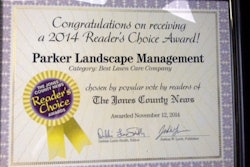
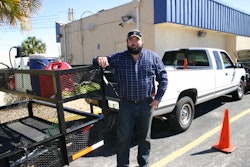







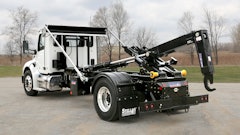
![Gravely Pro Turn Mach One My23 Dsc03139 Edit 1200x800 5b2df79[1]](https://img.greenindustrypros.com/mindful/acbm/workspaces/default/uploads/2025/10/gravely-pro-turn-mach-one-my23-dsc03139-edit-1200x800-5b2df791.BucBnDoN22.jpg?ar=16%3A9&auto=format%2Ccompress&fit=crop&h=135&q=70&w=240)



